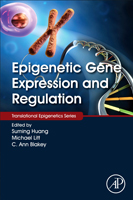Epigenetic Gene Expression and Regulation
Edited by: Suming Huang, Associate Professor, Department of Biochemistry and Molecular Biology, University of Florida College of Medicine, Gainesville, FL, USA
Michael Litt, Associate Professor of Medical Education Genetics, Center for Medical Education, Ball State University, Muncie, IN, USA
and C. Ann Blakey, Associate Professor, Department of Biology, Ball State University, Muncie, IN, USA

Description
Epigenetic Gene Expression and Regulation reviews current knowledge on the heritable molecular mechanisms that regulate gene expression, contribute to disease susceptibility, and point to potential treatment in future therapies.
The book shows how these heritable mechanisms allow individual cells to establish stable and unique patterns of gene expression that can be passed through cell divisions without DNA mutations, thereby establishing how different heritable patterns of gene regulation control cell differentiation and organogenesis, resulting in a distinct human organism with a variety of differing cellular functions and tissues.
The work begins with basic biology, encompasses methods, cellular and tissue organization, topical issues in epigenetic evolution and environmental epigenesis, and lastly clinical disease discovery and treatment.
Each highly illustrated chapter is organized to briefly summarize current research, provide appropriate pedagogical guidance, pertinent methods, relevant model organisms, and clinical examples.
Key Features
- Reviews current knowledge on the heritable molecular mechanisms that regulate gene expression, contribute to disease susceptibility, and point to potential treatment in future therapies
- Helps readers understand how epigenetic marks are targeted, and to what extent transgenerational epigenetic changes are instilled and possibly passed onto offspring
- Chapters are replete with clinical examples to empower the basic biology with translational significance
- Offers more than 100 illustrations to distill key concepts and decipher complex science
Readership
Basic biology and translational researchers above graduate level interested in developmental biology, genetics, health genomics, epigenesis in complex disease, and therapeutic possibilities
Table of Contents
Preface
- Epigenetic Gene Expression - An Introduction
- Histone Modifications - Models and Mechanisms
- Genomic Imprinting in Mammals – Memories of Generations Past
- Polycomb and Trithorax Factors in Transcriptional and Epigenetic Regulation
- Chromatin Dynamics and Genome Organization in Development and Disease
- ncRNA Function in Chromatin Organization
- Epigenetic Gene Regulation and Stem Cell Function
- Epigenetic Inheritance
- Transgenerational Epigenetic Regulation by Environmental Factors in Human Diseases
- Identification of Intergenic Long Non-Coding RNA by Deep Sequencing
- Regulation of Erythroid Cell Differentiation by Transcription Factors, Chromatin Structure Alterations, and Noncoding RNA
- Genetically Altered Cancer Epigenome
- Long Non-Coding RNAs and Carcinogenesis
- Epigenetics of Physiological and Premature Aging
- Epigenetic Effects of Environment and Diet
- Epigenetic Control of Stress-Induced Apoptosis
- Structure, Regulation, and Function of TET Family Proteins
- Epigenetic Drugs for Cancer Therapy
Available now at Store.Elsevier.com